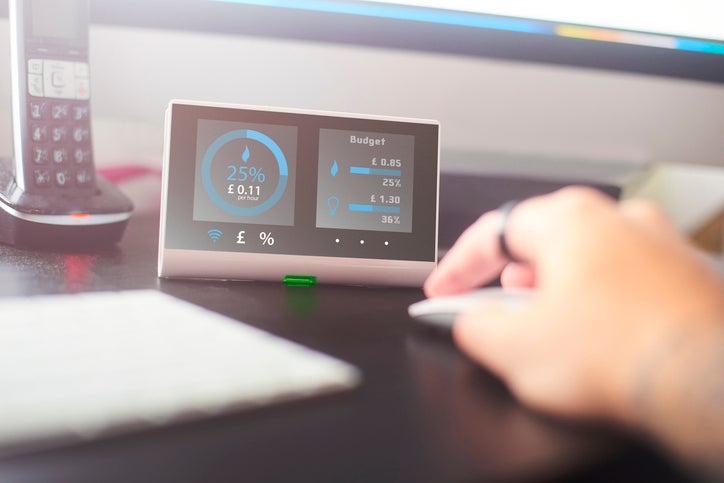Can you save money with a smart meter for business?
Getting a smart meter installed at your business premises means you’ll be able to see exactly how and when you’re using energy, which can really help to lower your bills and assist your energy efficiency efforts.
Let’s take a closer look at commercial smart meters.

Five-point summary
- Smart meters send gas and electricity readings directly to your supplier, eliminating estimated bills and manual meter readings. They also give you real-time usage data, helping you understand and manage your business energy consumption more effectively.
- With clearer insight into when and how your business uses energy, you can spot waste, cut unnecessary usage, and make smarter decisions — supporting both cost control and sustainability.
- There’s no upfront cost for smart meter installation, but the rollout is funded through charges built into your energy bill — so while it feels free, the cost is shared by all users.
- Under the government’s smart metering mandate, most small non-domestic premises must have a smart meter installed by the end of 2025. Larger businesses may need advanced or half-hourly meters, depending on energy usage.
- Suppliers can remotely switch smart meters from credit to prepayment, offering flexibility without needing a physical meter change. They’re also compatible with half-hourly data reporting, though they aren’t the same as full half-hourly meters used by high-demand businesses.
What is a smart meter?
A smart meter is an electronic energy meter that wirelessly sends automatic gas and electricity meter readings to your supplier for completely accurate energy bills. To help you better understand your energy usage, smart meters with a display screen show you exactly how much energy you’re using.
What are the smart meter benefits for business?
Although they’re usually aimed at domestic energy customers, the benefits of smart meters can also be enjoyed by business owners, especially if you’re trying to lower your business energy bills and implement energy efficiency measures in your workplace.
Here are some of the key benefits of smart meters for business:
- Accurate billing- Smart meters send automatic readings to your supplier, which means your bills are based on actual usage, not estimates. This helps avoid nasty surprises and makes it easier to manage your cash flow.
- Better control over energy use - With near real-time data, you can see exactly when and where your business is using the most energy. This visibility makes it easier to spot waste, adjust behaviour, and improve overall efficiency.
- No more manual meter readings - As smart meters send readings automatically, you won’t need to manually take energy meter readings or submit them to your supplier. It’s one less admin job to worry about.
- Easier budgeting and forecasting - Knowing how much energy you're using — and when — helps you plan ahead and budget more accurately. This is especially useful for seasonal businesses or those with fluctuating demand.
- Access to tailored tariffs - Some suppliers offer smart-meter-only tariffs, which could be more competitive or flexible than standard deals. Having a smart meter may also make it easier to switch suppliers in the future.
- Supports greener energy habits - By understanding your usage in detail, you can take practical steps to cut back on unnecessary energy usage, which is not only good for your bottom line but better for the planet too.
Is it compulsory to have a smart meter fitted at your business?
Having a smart meter installed at your business premises is completely free, so why are so many energy companies keen that you have one installed?
Although it’s not compulsory to have a smart meter installed, government policies mean that energy suppliers are obliged to offer one to all homeowners and all small business owners.
Regulations aside, energy suppliers are keen to push the rollout of smart meters as it means they’ll no longer need to estimate business energy use and they can save money by cutting the number of meter readers they send to homes and businesses.
When is the smart meter rollout? Why has it been pushed back?
The estimated cost of the smart meter initiative is £7 billion, and this will be passed on to households and businesses via their energy bills. The original target of having 85% of smart meter installations completed by 2020 was pushed back to 2024. This has since been pushed back further, to the end of 2025.
This is largely due to spiralling costs and the technology not being quite up to scratch. In many cases, the smart meter software wouldn’t allow consumers to switch, meaning they’d need to get a new smart meter each time they changed suppliers.
This roll-out has since been further delayed until 2025 because of coronavirus.
As a small business owner, it's likely your non-domestic meter is under an electricity profile class of 3 or 4 (it may be 1 or 2, but these are domestic class meters) or has gas consumption below 732 MWh/year (these tend to be smaller non-domestic sites). If so, it will be part of the ‘smart metering mandate’ and be part of the 2025 smart meter rollout obligations.
Large electricity supplies (profile classes 5-8 and 00) and large gas supplies (consumption over 732 MWh/year) need to have advanced meters fitted under Ofgem-regulated energy supply licence conditions. These tend to be larger non-domestic organisations, such as Industrial and Commercial (I&C) businesses.
How do smart meters work?
Each smart meter is made up of three components:
- Smart meter (one for gas and one for electricity) - takes readings of your energy usage.
- Communications hub - sends these readings to your energy supplier.
- Smart meter energy monitor - displays your real-time energy usage so you can monitor it.
As you use energy, real-time updates are displayed on your monitor and up-to-date readings are sent to your supplier, which means you no longer need to spend time taking and sending meter readings - it may only save a few minutes each month, but every second saved is important when you’re a busy business owner.
Are smart meters free for businesses?
Technically, no. While there is no direct, upfront cost to you, smart meters are not free. The installation costs that suppliers incur from installing smart meters are recovered through an increase in the price of your energy bills.
Can smart meters work with prepayment meters?
Unlike traditional meters, smart meters can be switched remotely by your supplier between credit and prepayment meter modes — meaning no need for manual meter changes or engineer visits. They also send automatic readings, and can share energy usage data in half-hourly intervals to help suppliers build a clearer picture of your business’s consumption.
However, smart meters aren’t the same as half-hourly meters, which are designed for larger businesses with high energy demand. If your business uses 100 kilovolt-amperes (kVA) or more in any 30-minute period, you’re legally required to install a half-hourly meter. If your usage is above 70 kVA, you can choose to have one installed voluntarily — especially if cutting consumption is a key focus for your business.
Want to learn more? Check out our guide to business energy for large and industrial sites.
How to read a smart meter
Smart Meters send readings to your supplier automatically. You can view these readings from your smart energy monitor. Each model of a smart energy monitor functions slightly differently, so you should consult your user guide for further information, bearing in mind you might need to check how to read a gas smart meter and an electricity smart meter separately.
Will having a smart meter affect the privacy of your data?
If you’ve Will having a smart meter affect the privacy of your data?any concerns about the data shared by your smart meter, it’s worth knowing that you can choose how much information you share with your supplier and how regularly they collect remote meter readings from your smart meter.
If you want to limit the amount of data your supplier sees, you should consider the following points:
- Sharing regular meter readings with your supplier more frequently means they can better help you understand your usage. Having a better understanding of how and when you use energy means you’ll make it easier for Bionic’s tech-enabled experts to find you a better deal at renewal.
- By default, your supplier will most likely collect data from your smart meter once a month, but they can take more regular half-hourly or daily readings if you’d prefer. If this is the case, you should speak to your supplier before your smart meter is installed. If you change your mind, you should be able to change your meter reading preference at any time by calling your supplier.
- For data protection, you should let your supplier know whether you’re happy to have details of your energy usage shared with other organisations, such as research agencies who may get in touch to ask you about your smart meter experiences.
- It’s also worth checking your supplier’s marketing preferences, as they might use your meter data to promote other products they offer.
How to get smart meters for small business use
Your energy supplier will provide and fit a smart meter at your business premises completely free of charge - there are no point of service charges as the costs of the smart meter rollout are absorbed by extra charges on everyone’s energy bills.
You can get a smart meter fitted at your workplace in three simple steps:
- Request a smart meter from your energy supplier.
- They’ll arrange an appointment for the engineer to visit your premises.
- On this date, an engineer will fit your meter. Smart meter installation typically takes about an hour per meter.
Your smart meters will need to be fitted in the same place as your existing meters, so you’ll need to clear this area before your installation appointment.








